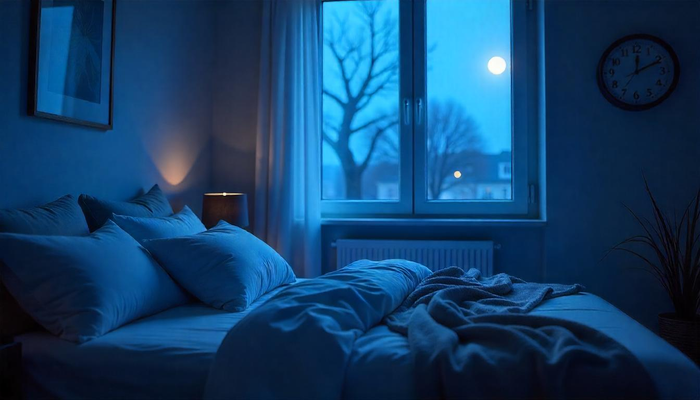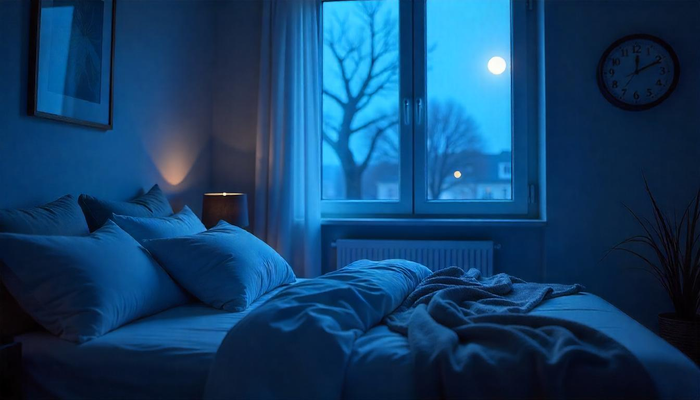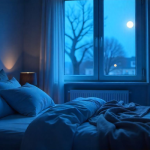Do you often find yourself lying awake in bed, staring at the ceiling, wondering why you can’t sleep at night? You’re not alone. Millions of people struggle with poor sleep — and it’s not just frustrating, it affects your health, mood, and productivity. In this post, we’ll uncover 7 of the most common reasons why you can’t sleep at night and share simple, science-backed solutions to help you finally get the restful sleep your body needs. And if you’re aiming for overall wellness, don’t miss our guide on Healthy Lifestyle Tips: 10 Ways to Maintain a Healthy Life.

Insomnia, or sleeplessness, is gradually becoming a silent epidemic. Busy lifestyle, stress, excessive use of technology, or wrong eating habits—all of this makes it seem like sleep is no longer a normal thing. However, sleep is as important to the human body and mind as food or water.
Lack of sleep makes the body tired and the mind weak, and concentration is disrupted throughout the day. Those who regularly suffer from sleep problems, their quality of life decreases. Sometimes it even causes depression, high blood pressure, and heart disease.
In this blog, we will find out what the 7 common causes of sleeplessness are and how you can easily find solutions at home. If you or someone close to you is suffering from this problem, then this article will become a necessary guide for you.
Stress and Anxiety: A Key Reason You Can’t Sleep at Night
Why does this happen?
The biggest enemy of our sleep is subconscious stress. The busyness of the day’s work, personal tension, relationship tensions, or thoughts about the future—these are the reasons why the brain is active, even after you lie down in bed.
Especially those who stay alone at night or who are thoughtful, they often see—after lying down, various things suddenly come to mind: old mistakes, fears of the future, office work, or uncertainty in life. All these disrupt the calming system of our brain, as a result of which the melatonin hormone cannot work properly, and sleep is delayed or repeatedly broken.
What is the solution?
🔹 The most effective solution to this problem is:
- Allocate a private time at night for yourself—where there is no thinking, just relax yourself.
- Do deep breathing exercises, such as inhaling for 4 seconds, holding for 4 seconds, and exhaling for 4 seconds.
- Write down the thoughts in a notebook instead of keeping them in your head—this will lighten your mind.
- If you want, you can listen to light classical music or guided sleep meditation.
Remember, calming the brain before sleep means preparing the body for rest—and that is the first step to reducing stress.
Can’t Sleep at Night? Excessive Screen Time Might Be Why
Do you scroll through your mobile before going to bed? Facebook, Instagram, YouTube, or TikTok—how often do you spend a lot of time looking at these?
This habit is actually one of the biggest obstacles to your sleep.
Why is this a problem?
The blue light emitted from the mobile or laptop screen signals our brain that “it’s still day.” This stops the body’s production of the melatonin hormone, which helps induce sleep.
As a result, no matter how tired you are, your eyes will not fall asleep.
Not only that, the content you see on the screen stimulates the brain. Especially if you watch thriller videos, tense news, or something stimulating, the brain will not be able to rest during sleep.
Ways to reduce the problem
Stop using all types of screens at least 30-45 minutes before bed
- Turn on “night mode” or “blue light filter” on your phone
- Create screen-free habits like reading, meditating, or listening to quiet music
If you really want to sleep well, keep yourself away from screens for a while—at least at night.
Wrong eating habits and caffeine intake
Do you eat a full biryani, spicy food, or cold soft drinks for dinner? Or do you drink coffee, tea, or energy drinks even after dusk?
These habits directly become the enemy of your sleep.
Why does it have an impact?
Eating heavy and spicy food at night takes time to digest. It causes gastric, heartburn, or a heavy stomach, so the body does not get rest during sleep. Many times, you may wake up in the middle of the night due to digestive problems.
And caffeine—it is a natural stimulant. It is present in tea, coffee, chocolate, and even many soft drinks. Caffeine keeps the brain active and reduces the secretion of the sleep hormone melatonin.
What is the solution?
- It is better not to eat anything containing caffeine after 8 pm
- Keep your dinner light and easy to digest—such as khichdi, milk, bread, and vegetables
- Finish eating at least 2-3 hours before going to bed
If you want, you can drink a glass of lukewarm milk before going to bed. Remember, proper eating and drinking means not only nutrition but also a good sleep.
Irregular sleep routine
You went to bed at 11 pm tonight, maybe tomorrow at 2 pm. Again, you slept for a few hours in the afternoon the next day. Such irregular sleep habits completely destroy our body clock, or biological clock. As a result, sleep does not come when we need it most.
Why can’t I sleep?
Our body has a natural sleep-wake cycle, which is called circadian rhythm. If you follow this rhythm, sleep comes at a specific time and is deep. But if your sleep routine changes repeatedly, your body gets confused—it doesn’t know when to sleep and when to wake up.
Especially those who sleep late on holidays or take long naps in the afternoon have trouble sleeping at night.
What’s the solution?
- Practice going to bed and waking up at the same time every day—even on holidays
- Reduce or eliminate daytime naps
- Wake up in the morning and spend some time in the sun—this keeps your circadian rhythm in check
- Go to bed even if you can’t sleep at night; this will create a habit
Adhering to the right sleep time means moving towards a healthy life.
Problems with the sleeping environment
Is your bedroom really “sleep-friendly”? Many times we don’t realize that our sleep problems may also be due to environmental factors.
What causes the problem?
Too much light, noise, or too much heat or cold—these disrupt the natural process of sleep.
Especially in city life, car horns outside and the sound of TV or other people’s conversations also disrupt sleep. Many people sleep with their mobile notifications on, which causes them to wake up in the middle of the night. On the other hand, excessive heat or dampness in the summer makes the room unsuitable for sleeping.
A comfortable, quiet, and dark room helps to induce sleep. During sleep, the brain prefers less light and noise, because then the body wants to gradually go into rest mode.
What is the solution?
- Use dim lighting in the bedroom, and you can also use an eye mask if you want
- Close doors and windows to reduce noise; use white noise if necessary
- Use a fan or a mild AC if necessary to keep the room cool
- Check whether the bed and pillow are comfortable
A quiet, comfortable environment means an “invitation to sleep” for the brain.
Physical Illness or Medication Side Effects That Make You Can’t Sleep at Night
Impact of physical illness
Many times, there may be a physical illness behind our inability to sleep. For example, asthma, ulcers, hyperthyroidism, or chronic pain. These diseases make the body unstable, as a result of which sleep may or may not come at all.
In addition, the side effects of some medications can also be harmful to sleep. Especially the caffeine content in antidepressants, stimulants, and cold medicines disrupts sleep at night.
If there are other symptoms of the body along with not being able to sleep at night—such as frequent urination, shortness of breath, or fatigue—then you should consult a doctor immediately.
What to do for good health
- Get regular health checkups and follow your doctor’s advice
- If you have side effects from your medication, tell your doctor and ask for a change in medication
- You can do light exercise or yoga at night to rest
- If sleep problems persist, it is best to see a specialist
A healthy body provides restful sleep—so it is important to be aware of your health.
Lack of Exercise or Overwork: How They Affect Sleep at Night
Lack of exercise or overwork—both can cause sleep problems.
If you are very active during the day, such as sitting all day or walking less, your body does not get tired properly. This does not allow you to sleep well at night because your body is not ready for adequate rest.
On the other hand, those who do excessive physical work, especially if they exercise or work very hard at night, also have reduced sleep quality. Because the body and brain are overly excited, they do not get rest easily.
Therefore, the right amount of exercise is needed—which will tire the body but will not put excessive pressure on it.
🔹Balanced exercise tips
- Do at least 30 minutes of light or moderate exercise every day, such as walking, yoga, or swimming
- Avoid heavy physical work at night; finish exercising at least 2 hours before bedtime
- Maintain proper nutrition and hydration along with physical exercise
- Try to be active in your daily life, such as using the stairs, taking short walks, etc.
Proper exercise is very beneficial for sleep—it increases fatigue in the body and calms the brain.
Can’t Sleep at Night? Try These Effective Sleep Habits
The importance of daily habits
Sleep problems are not only about understanding the causes but also about being able to solve them. By following some simple habits in your daily life, you can greatly improve the quality of your sleep.
Habits for healthy sleep
- Set a regular sleep schedule: Go to bed and wake up at the same time every day.
- Turn off the screen before bed: Turn off your mobile and TV at least 30 minutes before bed to calm your mind.
- Relax: Meditation, deep breathing, or light reading helps you sleep.
- Make the environment suitable: Keep the bedroom dark, quiet, and comfortable.
- Eat light meals: Dinner should be light and easy to digest.
- Exercise: Regular light exercise tires the body and calms the brain.
- Stay away from depression: Give yourself time to reduce stress.
Finally, if sleep problems are chronic, consult a doctor. But you can ensure a deep and healthy sleep by living a conscious and healthy lifestyle.
There are many reasons for not sleeping at night, but if you understand them and take the right steps, it is possible to reduce sleep problems to a great extent. Reducing stress, controlling screen time, proper diet, regular sleep routine, comfortable environment, physical fitness, and appropriate exercise—these are the keys to improving the quality of our sleep. Sleep is essential for our body and mind, so it is essential to take care of it.
If there is a permanent cause for sleep problems, then you should definitely seek the advice of a specialist doctor. Through healthy sleep, you will get a bright and vibrant life.





